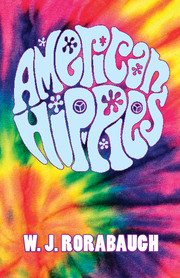3 - Bodies, Sex, and Gender
Published online by Cambridge University Press: 05 June 2015
Summary
During the Sixties, mainstream sexual attitudes and practices were transformed. Americans continued along a decades-long path of throwing off Victorian prudishness. Divorce gradually increased, as did out-of-wedlock births, and sexual topics, such as abortion, were discussed more openly. At the same time, censorship of books, magazines, plays, poetry readings, and films more or less ended. The biggest changes were the invention of the birth control pill, widespread adoption of the pill by young single women, and the end of the middle-class double standard that had allowed young men much more sexual freedom than had been available to young women. At the same time, many women embraced feminism, which challenged traditional gender roles. Amid these changes, hippies occupied a paradoxical position. Freaks embraced beliefs and behaviors that shocked traditionalists, but old ways were disappearing rapidly, and to some extent hippies merely endorsed society's shift toward sexual looseness. At the same time, they showed a decided ambiguity about feminism.
Hippies worshipped the human body. The San Francisco Oracle called for “the freedom of the body” and “the pursuit of joy.” This elemental celebration was rooted in the philosophy of the hippie counterculture. The body's existence was a matter of simple fact, and freaks reveled in facing facts openly. To do so was part of the search for authenticity. “Hippies despise phoniness; they want to be open, loving, and free,” noted the counterculture journalist Hunter S. Thompson. Glorification of the body beautiful also expressed a preference for simplicity and for honesty. Nothing, including the body, should be hidden from view. To hide the body was proof of impure motives. Mainstream culture's prudish attitude toward the body was proof of its corruption. Nudity expressed purity. Allen Ginsberg declared that his poetry was about “naked personal subjective truth.” To purge corruption, one must return to the Garden of Eden to embrace naked Adam and Eve. In “Woodstock,” the singer-songwriter Joni Mitchell yearned to return to the garden.
- Type
- Chapter
- Information
- American Hippies , pp. 91 - 131Publisher: Cambridge University PressPrint publication year: 2015



